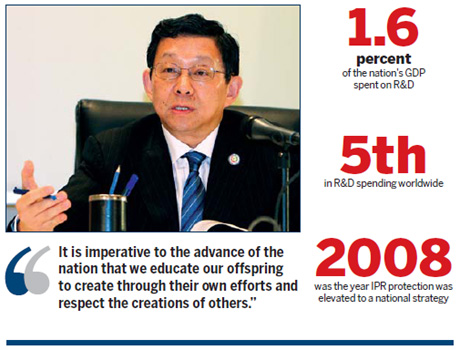IPR Special
IPR trust, communication and cooperation
Updated: 2011-04-28 07:55
By Chen Deming (China Daily)

More than 100 years ago American writer Ralph Waldo Emerson wrote in a letter to Scottish historian Thomas Carlyle: "I am ashamed that you should educate our young men, and that we should pirate your books. One day we will have a better law, or perhaps you will make our law yours."
There is no need to question China's determination and motivation to protect intellectual property rights (IPRs), because for the nation, IPR protection is at its deep level the protection of its national spirit.
It is imperative for and conducive to the advance of the nation that we educate our offspring to create through their own efforts and to respect the creations of others.
Meanwhile, the Chinese economy has been sharing the benefits generated by intellectual property as it becomes a driving force for economic growth.
China spends 1.6 percent of its GDP on research and development (R&D), the fifth-most in aggregate terms in the world. China is now one of the countries whose R&D is growing fastest and innovation is gaining steam.
China always takes IPR issues seriously. Unlike Western countries, China invests enormous administrative resources in proactive protection of IPR in addition to judicial remedies petitioned by IPR holders.
China has promulgated a national action plan for IPR protection every year since 2006. In 2008 IPR protection was elevated to be a national strategy. A special campaign against IPR infringement was initiated recently and is ongoing.
Such special campaigns are a unique administrative approach in China, but the fundamental purpose is to uncover deep-rooted problems through special campaigns and improve the long-lasting protection mechanism.
'Double-track' system
Ten years ago when we communicated with foreign friends the "double-track" system of administrative and judicial protection for IPRs, what we heard was largely confusion, doubt and worry.
Today, however, more and more foreign companies are turning to administrative protection of their intellectual property in China, and the "double-track" system is being improved as well.
An open China prospers. It is embracing the world with greater candor and a broader mind. Similar to the progress in other areas, China's IPR policies have been drawing on the advanced practices of the West.
We have solicited opinions and suggestions from all parties concerned, including foreign governments and industries during the process of developing and improving the institutions.
China has established bilateral exchange mechanisms on IPR with many countries and regions including the United States, the European Union, Japan, Switzerland, Brazil and Russia.
Discussions have touched upon a full range of issues in relation to IPR. Exchanges were also conducted with IP-intensive industries such as music, motion pictures, high-tech and the Internet.
China-US IP exchanges date back to the 1980s.
Since 2004, the two governments have held IP working group meetings under the Joint Commission on Commerce and Trade biannually, and exchanges between the two business communities have been expanding as well, driving forward bilateral trade and commercial relations.
China is now the third-largest market for US technology exports and hosts nearly 60,000 projects with American investment by the end of last September.
As bilateral exchanges on IP gets closer and deeper, China is working with relevant countries including the US to build mutual trust, clear up misunderstandings and increase the knowledge of the differences between each other.
International exchange
As globalization continues and information technology develops rapidly, IPR protection is facing new challenges, and the development of IPR itself is unbalanced.
There are no widely accepted rules regarding online counterfeiting and piracy, while counterfeiting in international trade reveals a complex supply chain of infringing goods that involves importers, retailers and consumers.
Developed countries focus on high standards of IPR protection while developing countries urgently need balanced IPR protection that covers traditional knowledge and genetic resources.
To meet the challenges and build a harmonious and balanced international IPR regime, countries have to collaborate.
Only through cooperation can common development and win-win results be possible.
China and the EU started an all-encompassing IPR cooperation program in 1996 that has enhanced mutual understanding and accommodation of each other's IPR system, and helped improve IPR protection in China.
Through this successful program, China and the EU have explored an effective and mutually beneficial approach of cooperation that can serve as a role model of IPR cooperation between developed and developing countries.
China and the US have also witnessed effective cooperation in the fields of patents, trademarks and copyrights.
The two countries are in discussions about a comprehensive IPR cooperation program.
China will continue to expand and deepen IPR cooperation in the spirit of equality, respect, openness and candor with a view to promoting the progress and dissemination of technology and to contribute to the well-being of mankind.
Trust comes from communication, and cooperation brings win-win results. China is ready to step up extensive IPR cooperation with a positive attitude, honor its international commitments, work closely with other countries to promote innovation and development, and attain the goal of harmonious and balanced development of the international IPR regime.
Minister of Commerce
(China Daily 04/28/2011 page6)
Specials

Costly dream
Uninhabited havens up for lease but potential customers face wave of challenges.

Models gear up car sales
Beauty helps steer buyers as market accelerates.

Urban breathing space
City park at heart of industrial hub positions itself as top tourism attraction